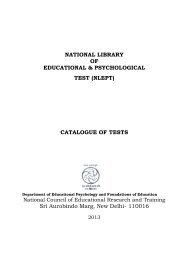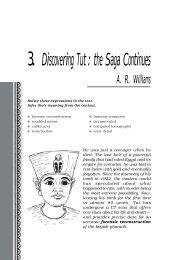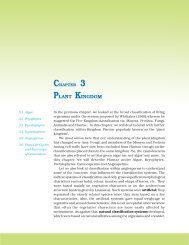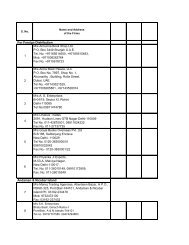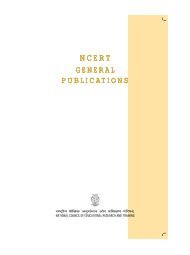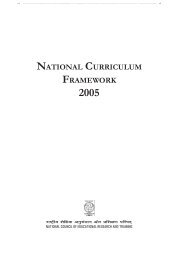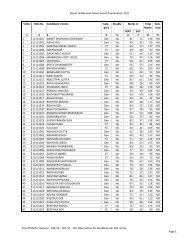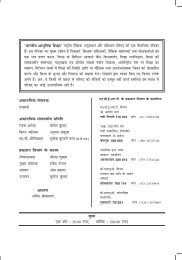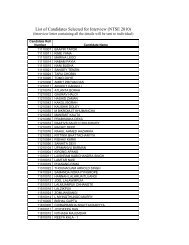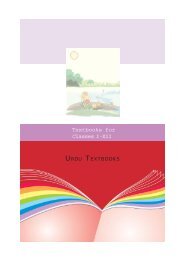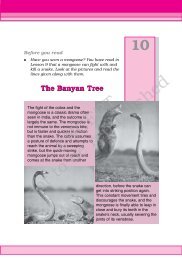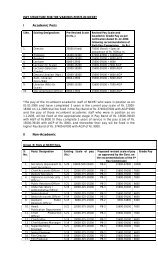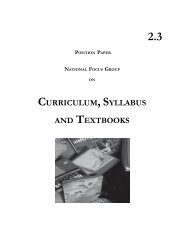Annual Report - National Council Of Educational Research And ...
Annual Report - National Council Of Educational Research And ...
Annual Report - National Council Of Educational Research And ...
You also want an ePaper? Increase the reach of your titles
YUMPU automatically turns print PDFs into web optimized ePapers that Google loves.
An Investigation into Different Approaches to Development of<br />
Environmental Studies Curriculum by States<br />
An investigation into different approaches to development of environmental studies<br />
curriculum by states to see how different concepts are integrated to environment at<br />
primary level in different states. The objectives of the programme are; to understand<br />
various approaches followed by different States/UTs in the development of EVS<br />
Curriculum for primary classes; to analyse and understand how the concepts of<br />
science and social science have been integrated at primary level; and to investigate<br />
how the concepts of science and social science are integrated in relation to<br />
environment at primary level. Following the initiative taken by NCERT on the States/<br />
UTs syllabi and textbooks revision, nineteen states have revised their syllabi in the<br />
light of NCF 2005. Analysis of the revised syllabi shows that some states teach EVS<br />
as a separate subject as science and social science from Class III to Class V, whereas<br />
some states have one EVS textbook with separate sections of science and social<br />
science. Also, the selection and presentation of content reflects different approach<br />
to teaching of EVS. In view of this there is a need to understand different approaches<br />
followed by different states in the development of EVS curriculum and textbooks.<br />
The analysis of EVS textbooks for different States shows that different approaches<br />
are followed by States in the development of EVS Curriculum. Manipur teaches<br />
EVS from Class III-V as integrated subject consisting of the component of science<br />
and social science concepts drawn from the immediate environment. Nagaland<br />
teaches EVS from Class III-IV as separate component of science and social science<br />
in one textbook. Maharashtra teaches general science and social sciences as separate<br />
subject from Class III-V.<br />
Group Arithmetic<br />
Group Arithmetic was constituted by NCERT in September 2007 for initiating<br />
steps for the qualitative improvement of teaching and learning of mathematics at<br />
primary level. During 2010-2011 Group Arithmetic published “Teachers training<br />
manual” for Class I and II. The manual has been translated in Hindi. Four teacher<br />
training programmes for the teachers of Haryana, Chhattisgarh, Uttarakhand<br />
and <strong>And</strong>hra Pradesh were conducted by Group Arithmetic. The draft of user’s<br />
manual accompanying Mathematics Learning Kit has also been developed. The<br />
work for a book on the compilation of stories, puzzles, rhymes etc. in mathematics<br />
for Class I and II has been initiated.<br />
Environment Education<br />
The department has been entrusted to monitor the implementation of<br />
environmental education by all States/UTs in compliance with the judgment of<br />
Hon’ble Supreme Court. The department has been implementing the environment<br />
education through an infusion model based on the guidelines of NCF-2005. The<br />
project books on environmental education for Classes VI to X have been published<br />
as per the affidavit submitted by the <strong>Council</strong> to Hon’ble Supreme Court of India<br />
to bring about attitudinal changes among the students in favour of environment.<br />
The project based syllabus for the higher secondary stage has been publised.<br />
The teachers’ handbook for the implementation of project based syllabus is also<br />
being printed. Environment related activities to sharpen the thinking capabilities<br />
of students were held during the 37th JNNSEC at Jaipur.<br />
Meeting of the state officials responsible for the actual implementation of<br />
environment related projects and activities through eco-clubs and the concept<br />
and concerns through the curriculum was held at NIE Campus during March<br />
<strong>Annual</strong> <strong>Report</strong> 2010-11<br />
<strong>Annual</strong> <strong>Report</strong> 2010-11<br />
<strong>Annual</strong> <strong>Report</strong> 2010-11<br />
55



